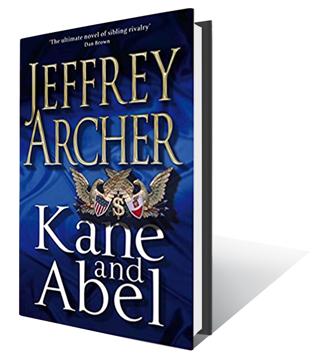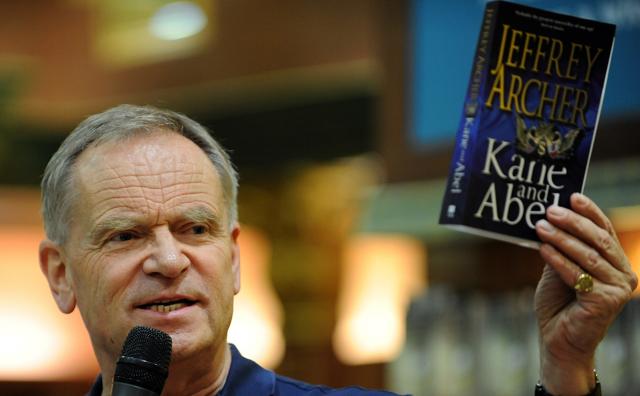Interview: Jeffrey Archer on the 40th anniversary of Kane and Abel
Forty years after it was first published on November 26, 1979, Kane and Abel continues to sell 2,50,000 copies a year. Jeffrey Archer talks about his first big success

In the mid-1970s, Jeffrey Archer was staring at bankruptcy, having lost heavily to a fraudulent investment company. He sat down and wrote a thriller, Not A Penny More, Not A Penny Less, his very first book. He had great hopes riding on it.
“After I wrote Not a Penny More…, I thought, like everyone else who has written a book, that it’s going to be an instant best seller. But it sold 3,000 copies in the first year,” the master storyteller told me back in 2011 during our first meeting in Kolkata.
Undeterred, he wrote another one. Kane and Abel was published in 1979. “And the whole of my life changed overnight,” Archer recalled.
Kane and Abel sold a million copies in the first week itself. A dream for any writer. Forty years later, Kane and Abel continues its dream run, selling 2,50,000 copies a year. On its 121st reprint, the book has sold some 32,700,000 copies. That’s more than the entire population of Malaysia or Peru.
“It’s now the eleventh most successful novel in history, one behind To Kill A Mockingbird (by Harper Lee), and one ahead of War and Peace (by Leo Tolstoy). A 100 million people have read Kane and Abel. When I was in India, the papers told me some 50 million people in India have read it. It’s a wonderful number to have, though, I understand some of it is because of pirated copies.”
Lord Jeffrey, 79, had the figures at the tip of his fingers when I dialled him in his London home to congratulate him on the 40th anniversary, which will be celebrated on November 26.
To mark the occasion, there’s a special edition. “Will you please inform the readers of the Hindustan Times, the 40th year edition is a beautiful hardback with the original American cover. But there are only 1,000 copies. It’s a limited edition, signed, and the only way you can get it is by getting in touch directly with the publishers, Macmillan,” he said.
I ask him if he had any inkling that the book would have such long legs.
“No, no, no! You can’t dream those things. I thought it would do well. When it sold a million in the first week, I seriously thought, now this could be something special. But I did not imagine 40 years later, it would still be selling over quarter of a million copies a year!”
He credits the success and shelf life to the simplicity of the story. Speaking about the germ of the idea, he said, “Well, it’s very simple. It’s the story of two men, both born on the same day, one with nothing, one with everything. They only meet once, but it changes their whole life! It’s a very simple story, and a quarter of a million words later, you’ve got Kane and Abel.”
Kane is William Lowell Kane, a blue-blooded Boston Brahmin born into a wealthy banking family in America. In school, Kane couldn’t make too many friends because even as a little boy, he would only speak with children from families wealthier than his own. And there weren’t that many of those. His father dies on the Titanic, and William displays great intelligence in running and growing his family’s banking empire.
Abel is Abel Rosnovski, the illegitimate son of a Polish baron brought up by a trapper family. He escapes concentration camp in Siberia and makes his way to the United States, where he gets into the hotel business by chance and becomes a successful hotelier by the dint of his wits and hard work. William Kane refuses a bank loan to Abel’s friend and business partner, causing him to jump off his own hotel window. Abel blames Kane for the death, and thus begins a lifelong enmity between the two men that makes for a smashing story that compels the reader to keep turning the page.

One might find glimpses of Kane and Abel in Archer’s other works, like The Clifton Chronicles and Heads You Win. The author agrees. “Yes, I think as a storyteller I do write about people who want to achieve. So, you are quite right. Harry Clifton is an achiever, and in Heads You Win, both of them (Alexander and Sasha), they are the same person, but they want to achieve.”
When I visited Lord Jeffrey in London this summer, I was surprised to learn that Kane and Abel might have been called something else entirely.
“It was originally called ‘The Brothers’, then it was called ‘The Protagonists’, but I thought they were a bit dull. And one day I was walking along the embankment and suddenly I threw my arms in the air and started screaming… that’s when the title Kane and Abel came to me. It helps if you can get a title that people will remember. I think one of the joys of Kane and Abel is that it’s such a simple title. It’s quite hard to forget.”
One of the things that he and I always disagree on is picking favourites. I tell him I like Abel more, he rolls his eyes and calls me a “silly romantic.” But he agrees that different countries like one or the other protagonist.
“You are quite right, the Americans do love Kane more. Well, of course, they do! Kane’s born in Boston, he’s a snooty individual, he comes from a snooty family and he’s got everything. And of course the Indians love Abel. I think in India it’s the aspirational part of the story… the Indians are very ambitious and hardworking, and I think that’s what appeals to them. Abel comes from Poland and he goes to America and he beats them all! Yeah, you bet! And his daughter goes on to be the President of the United States,” he laughed.
In 1982 Archer published a sequel to Kane and Abel, titled The Prodigal Daughter. It follows the life of Abel’s daughter Florentyna, the man she marries (any guesses whose son it might be?) and how she becomes the first woman President of the US.
This book too, like almost all his titles, was a bestseller. But even after two dozen novels, a dozen short story collections, a three-part prison diary, a few plays and a few children’s books, Jeffrey Archer is most famous as the writer of Kane and Abel.
Watch:
Does it seem a bit unfair, I asked.
“Well, I do believe that A Prisoner of Birth is as strong a novel, perhaps, but I think the problem is that it’s got its own little world, Kane and Abel. And there’s not much I can do about it,” he said.
Archer has always been partial towards A Prisoner of Birth, and one time after much (polite) prodding, he had confessed that it was his favourite among his own books.
But prod as I may, he won’t pick his favourite between Kane and Abel.
“No! They are equal. I love them both. At the end of the book, you are not meant to have a favourite, you are meant to feel equally about both of them. That’s what I tried to achieve.
May be he will answer this one when we celebrate the 50th year of Kane and Abel.
Samhita Chakraborty is an independent journalist.






